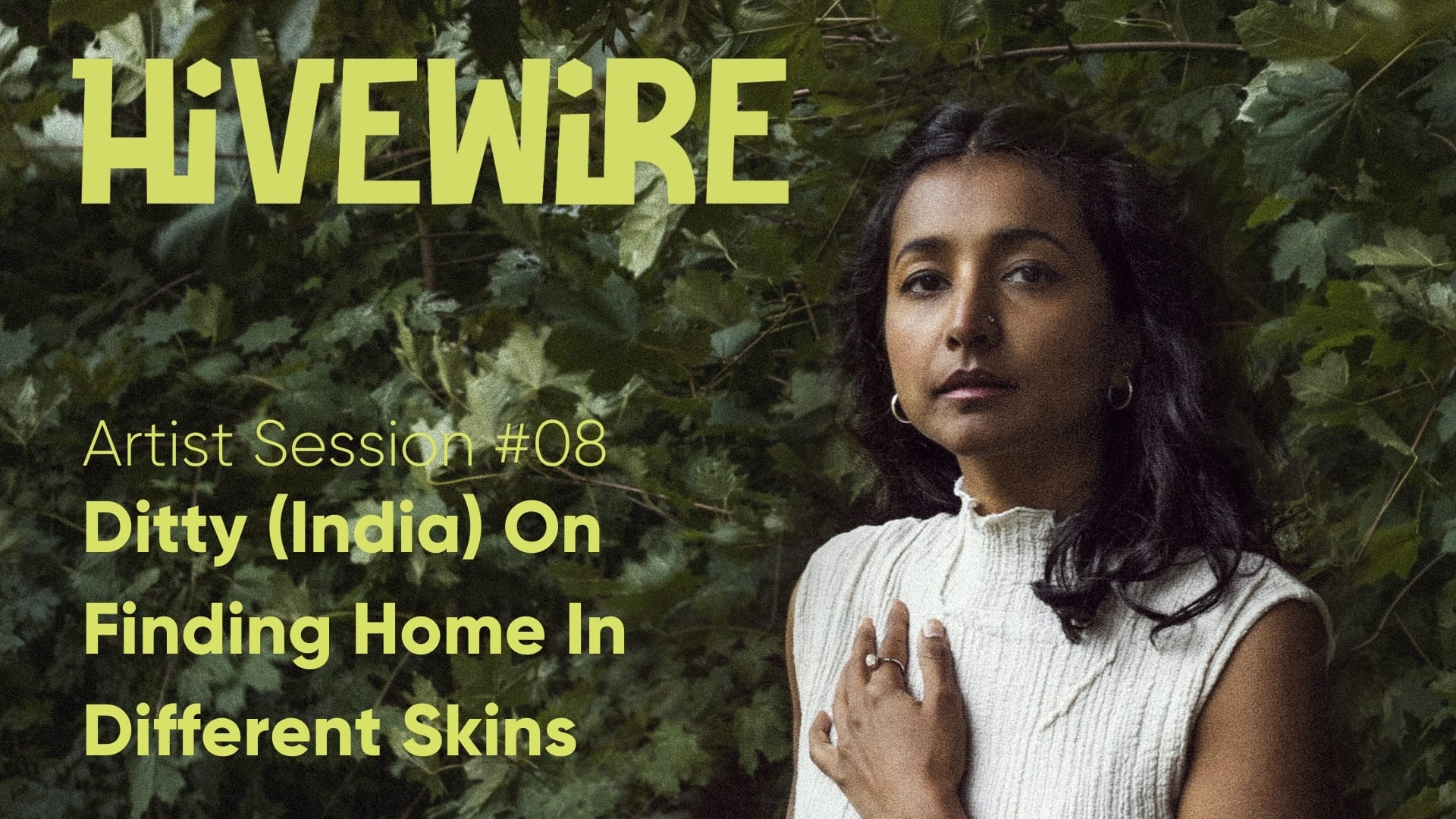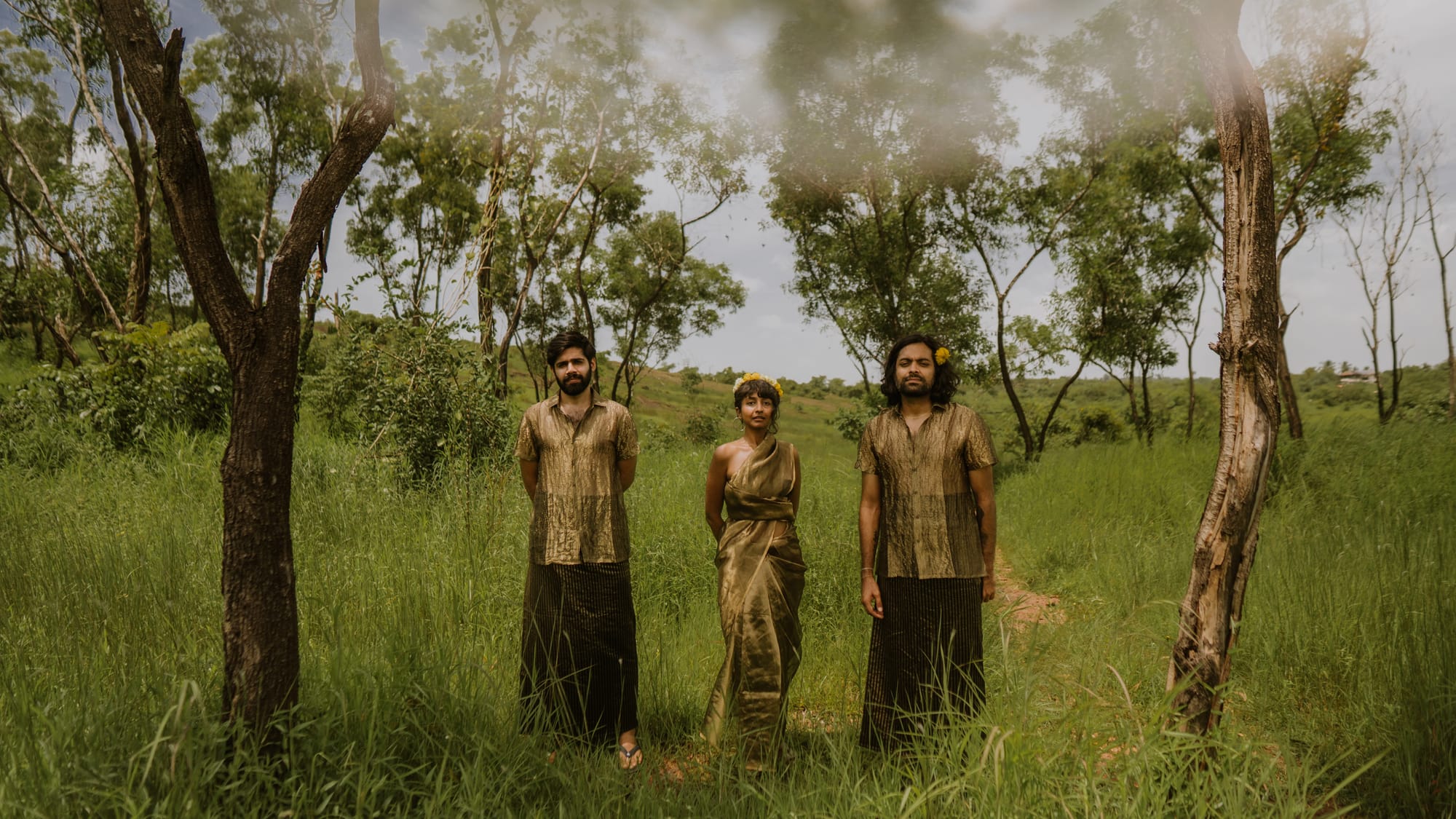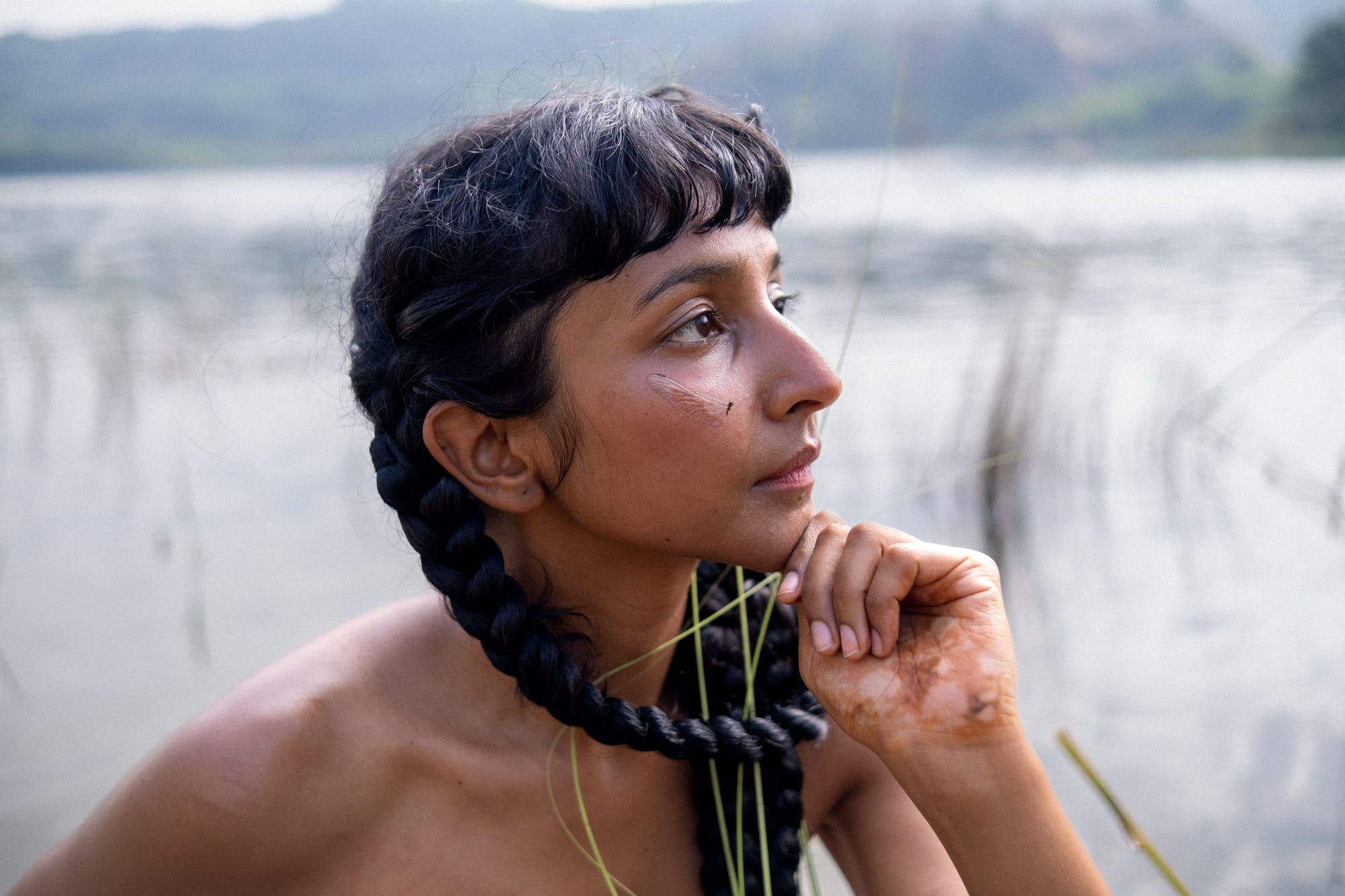Artist Session #08: Ditty (India) On Finding Home In Different Skins
Folk and Pop coalesce on Skin by Ditty (India), for evocative musings on finding comfort in life and the world around us.

Locating her sound at the nexus of Pop and Folk on ‘Skin,’ singer-songwriter, urban ecologist, and architect Ditty delicately constructs messaging that evaluates the state of both our natural environment and the human condition. On this first release after 5 years, the New Delhi native draws parallels between the biological and ecological, personal and collective. Across her 5-track EP, the independent artist deftly threads poetic lyrics and metaphoric thoughts into her songwriting. The result is an evocative yet comforting listen, simultaneously balancing calls towards deeper considerations and actions with wider consideration. Below, Ditty lets us in on her creative process, childhood influences, and overarching aspirations:
Mayuyuka: I guess just to contextualise the spaces you occupy, tell me a bit about yourself - what makes you you, and what makes you make music?
Ditty: My name is Aditi Veena and I have a musical project by the name Ditty. I’m a singer-songwriter. My education was to be an architect actually, and I worked for many years before I began releasing music. In a sense, I have these two sides to my life. At the moment, it's more music. I have always been singing as far as I can remember. I don't come from a musical family - I come from a conservative, middle-class Indian family.
I actually started writing music at a tipping point in my life, actually, in 2014, when I lost my dad. I think that was a really profound moment for me to understand how much I was supported by this art form. It really helped me that whole period of my life. Music was a huge ally and that was really the time I started to write songs.
Mayuyuka: Tell me about where poetry comes in
Ditty: I'm sitting with myself a lot, with my guitar, just sublimating a lot. Like, when I find something interesting or want to say something, I often just open my book and write it down. It's poetic. I like to use this medium to express myself because it's a bit romantic. It makes life just more bearable and more beautiful and aesthetic. I think poetry is a huge part of how I also want to live. I love to just find spaces or find the time to really connect with the instrument, with the body of the guitar. Things emerge from there - where there's resonance, and I feel like I’m in a space where I can play and be free to express myself. For me it's a really spiritual place, to be able to go there and really feel connected.
Mayuyuka: It’s comforting, I suppose. So why the five-year gap between your debut and ‘Skin’?
Ditty: I don't know how this time flew, but it did! In '21, I actually released another record called 'Rain Is Coming' but not as Ditty; it was as Faraway Friends. The pandemic was a huge shift for all of us, and I went through a huge transformation. I went through a big separation and also moved out of my own home. I mean, that was not all, I also had a really beautiful time. I got signed to a label here in Germany. I came here and met some incredible people. I'm now part of this wonderful scene here. I had to start over somewhere, and I built my life around this place. I started over, so it took some time, as all good things do.
Mayuyuka: What was the overarching concept that you wanted to communicate with ‘Skin’?
Ditty: ‘Skin’ is special - I was thinking a lot during the pandemic about this idea of slowing down. I really struggled with the post-pandemic world, to be honest, I find everything too fast-paced. I thought the pandemic was a blessing; seeing everyone taking the time to do what was important like being united with their loved ones and learning how to love themselves. Seeing the rivers revive themselves and seeing the city's air becoming better, for me, was a really positive experience.
I wanted to put that into song, I guess. By skin I mean the skin of the earth, which is the biosphere. Some of the songs like "Mamma" and "Money" are really just love letters to the earth. I was also displaced by the pandemic, so I had to find a home within myself. I'm talking about what that means: slowing down, embracing ourselves, listening to our bodies, and making peace with things that aren’t pleasant. We have to first accept ourselves in our entirety to be able to love ourselves.
Mayuyuka: There's a line on your press release about us treating our bodies like we treat the earth. Can you expand on that? I'm assuming the music is both like the mirror and the cure for that?
Ditty: Yeah, for me, it is. So, I think, also, my background is in architecture and urban ecology. I worked for many years as an independent researcher for several different organisations. We're brought up to think we have to be productive, and even if it means not listening to ourselves, even if it means cutting off something really primordial like our need for rest, recuperation, or nourishment, we would cut it off. Like, people's backs and necks are hurting but they go on. This is also the root of the whole problem, this crisis we have created with the climate. We have separated ourselves so much from the natural world.
There's also this other side which I find really, really destructive. The attitude that we have now in society with the idea of creation is really distorted, because now we're manufacturing seeds and we treat the land as a machine through industrial agriculture. I was so shocked to be back in India this time. Something was catching my attention more and more... now we're doing the same with the female body! There was this upsurge in fertility clinics. So many women are having trouble conceiving, and so many women are undergoing artificial insemination. The women are being pumped with hormones, artificial hormones and eggs are being treated in laboratories - just like how we’re treating seeds. We are really meddling with the process of creation. That’s what I'm saying when I say we’re treating the earth's body and our bodies in the same way.
Mayuyuka: I hadn't seen it like that. Like. We're sort of breaking the thing down, the natural thing, by how we behave and then fixing it artificially. Yeah?
Ditty: Or thinking we can fix it.
Mayuyuka: And there's going to be more damage caused by trying to fix it that way, right?
Ditty: We're not fixing the root of the problem, which is that we are not connected anymore.
Mayuyuka: So the music serves as an intervention, or like, I guess, a protest?
Ditty: Primarily, I'm making music from the heart. These were some prompts while writing, but, first and foremost, I'm making the music for myself. I want to say to myself, 'There will be things money won't buy,' and I want to say to myself, 'Make forests not war'. I'm basically saying, 'I'm home and I'm sorry I haven't been there'. During the pandemic, I realised that I didn't really know how to be alone. I struggled so much because I just didn't know how to be there for myself. I didn't know how to hold my difficult emotions and soothe myself. I had to learn how to manage my own dark sides and that's the basis for what I want to say. Then of course if it resonates with other people, that's wonderful.
Mayuyuka: Your background in ecology and architecture is quite clear in the music and what you’ve shared but does it happen in reverse, where the music teaches you something you can apply in those fields?
Ditty: I think that as a musician, you have a lot of freedom to just think out of the box, be creative; to play. This is definitely informing the way I also approach my research and the other work I do. I'm always trying to bring in different perspectives or creative ways of presenting the research.
Mayuyuka: Speaking of perspectives, tell me about the visual elements that have accompanied 'Skin'
Ditty: This was the first time I tried to delve a bit more into the video aspect of things. It was very important that the visuals carried the same feeling that the music was conveying. At the moment I've released three videos. I reached out to all three filmmakers, knowing the kind of style that they work with. I love to work with other artists, whether it's musicians, filmmakers or dancers. My process is to really trust. I always find a language that I love that this other person is creating and then I don't impose myself, just surrender and let the process reveal something to us.
With “Hold Me,” for example, we made the video in two days and we managed to shoot these very dreamy scenes. I was playing a few festivals in the northeast and Shrutiman (Deori) was like 'Hey, you can just come and we'll do something.' We had such limited footage but I met these wonderful filmmakers in Bombay who were so happy to cut this and did such a fantastic job!
Mayuyuka: You split your time between Berlin and India. How does your geographic location affect your creative output?
Ditty: My creative practice continues, but the geographic location has a huge impact at that moment of course. I grew up in Delhi, have lived in Goa and Sri Lanka before and was also in the UK for a little bit. Germany is a totally different feeling and a scene because the language is different. In the beginning, I also encountered a lot of racism and it feels like I really am a first generation immigrant. I really feel that in my bones. I think, in some ways, living in the West is a hugely disempowering experience, so it's really encouraging me to also write in my mother tongue, which is Hindi. I really miss the language so this is the first time I started to write in it. I also started to approach topics of migration, racism and feeling away from home through the new record I'm writing.

Mayuyuka: On that note of feeling removed, I pulled out a sentence from the press release, which really interested me. Describing you as taking an authentic approach to Indian Pop. What is an authentic approach for you in terms of your heritage and culture?
Ditty: I grew up listening to Indian Pop. That was my background as a child, before I got exposed to music from the West. For instance, I was selected to represent my school at inter-school competitions. That was my entry into the music scene in India. I remember being so motivated, training myself and doing my scales every morning. I started singing in this wonderful choir called Artists Unlimited - we sang all kinds of stuff and rearranged music so that was my primer. Since then I've been singing in English, making music that's more or less inspired by the West. Some years ago I started to think about what Indian Pop is at the moment. I was questioning myself - 'How is this Indian and what am I doing?' - because I didn't feel connected to the Bollywood side of things. My bandmates are part of this other band called Peter Cat Recording Company and we're all making music in English. We were colonised and this is the language we think in. This is the post-colonial indie Pop that emerged at a moment like this.
Mayuyuka: Also thinking of the notion of home - it could be a place like Delhi, the pale blue dot we call earth, ourselves or other people? How do you keep these aligned?
Ditty: It's a constant struggle for me because I live out of a suitcase so much. At the moment home is wherever I am. I'm in Berlin and I also moved here to be closer to my partner. I think home for me is my loved ones, partner and family. I also have to feel safe in my body and I have to feel comfortable. As I grow older these small gestures of feeding myself and taking care of my body have become so important to me. These very basic things are a better approach.
Mayuyuka: A song I wanna zoom in on is "Money" 'cause when you say 'Do you know where money comes from' the first thing that pops up in my head is trees!
Ditty: I wanted to paint that picture of the natural world. I used to live in Goa and there was a forest outside our house. There was this really beautiful Rain Tree that used to lean over the window of my bedroom. I wrote this song when I came back from tour one day and it was gone. It really disturbed me because it felt really wrong. You somehow find a place in the world… then there’s nothing! I had also spent some time gathering samples, so a lot of the samples in the end of the song are kind of like a funeral trumpet. I wanted to create this feeling of the tree being chopped down and the animals giving a funeral to the tree.
Mayuyuka: That’s crazy ‘cause you know what my next question is? There's waves, there's chirping, there's horns and it feels like there’s elephants playing trumpets. Let’s talk about “Mamma” too, what's the idea behind the line ‘I'll make an army of wildflowers’?
I wrote this song in response to the CAA [Citizenship (Amendment) Act]. There were huge protests in the country and then the pandemic hit so the CAA took a back seat. They were going to scrutinise all the people who moved to India, it could be before partition, and enforce a migrant law that excludes the Muslims. At some point they were even thinking of creating some kind of camps they would move the Muslims to. I can't believe that this is happening now in 2024! So I guess I was writing a song for peace at the same time there's a lot happening here and everywhere. An army of wildflowers just means people who are against war.

Mayuyuka: Hivewire’s Akriti also came across your merchandise, which is wildflower seeds. It’s like life imitating art, how you’ve brought that into the world.
Earlier I'd made postcards that would have a download code to an illustrated lyric booklet. I've also made badges from wood and upcycled totes. This time I just thought I could sell seeds and seed bombs.
Mayuyuka: I think it's a great idea because it represents your ethos. It’s an actual expression of the ideas you have.
It's great for everybody, and the planet.
Mayuyuka: That conscious choice extends to your tours too?
I’m aiming for my tours to be carbon neutral. I just want to see if it's possible, and it is! It just needs venues, promoters and everybody to align a little more.
Check out the HIVEWIRE playlist - The Hive
One 'The Hive' is where our diverse team shares new music and trends from emerging markets. New additions this week:

